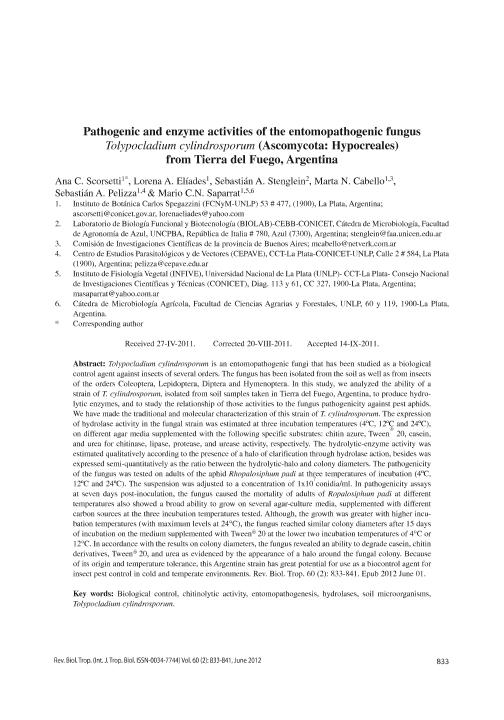Artículo
Pathogenic and enzyme activities of the entomopathogenic fungus Tolypocladium cylindrosporum (Ascomycota: Hypocreales) from Tierra del Fuego, Argentina
Scorsetti, Ana Clara ; Eliades, Lorena Alejandra
; Eliades, Lorena Alejandra ; Stenglein, Sebastian Alberto
; Stenglein, Sebastian Alberto ; Cabello, Marta Noemí; Pelizza, Sebastian Alberto
; Cabello, Marta Noemí; Pelizza, Sebastian Alberto ; Saparrat, Mario Carlos Nazareno
; Saparrat, Mario Carlos Nazareno
 ; Eliades, Lorena Alejandra
; Eliades, Lorena Alejandra ; Stenglein, Sebastian Alberto
; Stenglein, Sebastian Alberto ; Cabello, Marta Noemí; Pelizza, Sebastian Alberto
; Cabello, Marta Noemí; Pelizza, Sebastian Alberto ; Saparrat, Mario Carlos Nazareno
; Saparrat, Mario Carlos Nazareno
Fecha de publicación:
06/2012
Editorial:
Universidad de Costa Rica
Revista:
Revista de Biología Tropical
ISSN:
0034-7744
Idioma:
Inglés
Tipo de recurso:
Artículo publicado
Clasificación temática:
Resumen
Tolypocladium cylindrosporum is an entomopathogenic fungi that has been studied as a biological control agent against insects of several orders. The fungus has been isolated from the soil as well as from insects of the orders Coleoptera, Lepidoptera, Diptera and Hymenoptera. In this study, we analyzed the ability of a strain of T. cylindrosporum, isolated from soil samples taken in Tierra del Fuego, Argentina, to produce hydrolytic enzymes, and to study the relationship of those activities to the fungus pathogenicity against pest aphids. We have made the traditional and molecular characterization of this strain of T. cylindrosporum. The expression of hydrolase activity in the fungal strain was estimated at three incubation temperatures (4ºC, 12ºC and 24ºC), on different agar media supplemented with the following specific substrates: chitin azure, Tween® 20, casein, and urea for chitinase, lipase, protease, and urease activity, respectively. The hydrolytic-enzyme activity was estimated qualitatively according to the presence of a halo of clarification through hydrolase action, besides was expressed semi-quantitatively as the ratio between the hydrolytic-halo and colony diameters. The pathogenicity of the fungus was tested on adults of the aphid Rhopalosiphum padi at three temperatures of incubation (4ºC, 12ºC and 24ºC). The suspension was adjusted to a concentration of 1x107 conidia/ml. In pathogenicity assays at seven days post-inoculation, the fungus caused the mortality of adults of Ropalosiphum padi at different temperatures also showed a broad ability to grow on several agar-culture media, supplemented with different carbon sources at the three incubation temperatures tested. Although, the growth was greater with higher incubation temperatures (with maximum levels at 24°C), the fungus reached similar colony diameters after 15 days of incubation on the medium supplemented with Tween® 20 at the lower two incubation temperatures of 4°C or 12°C. In accordance with the results on colony diameters, the fungus revealed an ability to degrade casein, chitin derivatives, Tween® 20, and urea as evidenced by the appearance of a halo around the fungal colony. Because of its origin and temperature tolerance, this Argentine strain has great potential for use as a biocontrol agent for insect pest control in cold and temperate environments.
Archivos asociados
Licencia
Identificadores
Colecciones
Articulos(CCT - LA PLATA)
Articulos de CTRO.CIENTIFICO TECNOL.CONICET - LA PLATA
Articulos de CTRO.CIENTIFICO TECNOL.CONICET - LA PLATA
Articulos(CEPAVE)
Articulos de CENTRO DE EST.PARASITOL.Y DE VECTORES (I)
Articulos de CENTRO DE EST.PARASITOL.Y DE VECTORES (I)
Articulos(INBIOTEC)
Articulos de INSTITUTO DE INV. EN BIODIVERSIDAD Y BIOTECNOLOGIA
Articulos de INSTITUTO DE INV. EN BIODIVERSIDAD Y BIOTECNOLOGIA
Articulos(INFIVE)
Articulos de INST.DE FISIOLOGIA VEGETAL
Articulos de INST.DE FISIOLOGIA VEGETAL
Citación
Scorsetti, Ana Clara; Eliades, Lorena Alejandra; Stenglein, Sebastian Alberto; Cabello, Marta Noemí; Pelizza, Sebastian Alberto; et al.; Pathogenic and enzyme activities of the entomopathogenic fungus Tolypocladium cylindrosporum (Ascomycota: Hypocreales) from Tierra del Fuego, Argentina; Universidad de Costa Rica; Revista de Biología Tropical; 60; 2; 6-2012; 833-841
Compartir
Altmétricas



